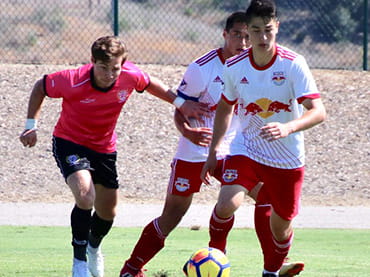The Challenge: Feeling Sluggish and Sleeping A Lot
A lifelong soccer player, 17-year-old Kazu was taking part in pre-game warmup drills with his soccer team in October 2017.
After a series of heading drills, Kazu noticed that something was off. Despite feeling this way, he still played in the soccer game later that day.
Once the game ended, Kazu got an intense headache and felt “incredibly lethargic." What made things worse is that his symptoms didn't go away.
Kazu — whose mom describes as happy, confident, and carefree — was now spending a lot of time alone in his bedroom sleeping.
He was also having the following symptoms:
- Light and noise sensitivity
- Headaches
- Dizziness
- Trouble focusing
- Nausea
With his symptoms getting worse, Kazu and his family knew he needed to seek help. They would later learn his symptoms were from a concussion.
Kazu's Path to the UPMC Sports Medicine Concussion Program
During the next few months, Kazu went to more than 10 doctors seeking help treating his concussion. Kazu's mother, Martha, recalls feeling hopeless during that time.
“Doctors we saw told him to rest, pamper himself, spend time in dark rooms. They said he should listen to his brain telling him to slow down," Martha says.
They also said Kazu should not play soccer during his recovery. This was extremely hard for him. The game was so much a part of his identity and purpose.
“Our son changed into a depressed, anxiety-ridden, angry child whom we barely recognized," Martha recalls.
Not wanting to give up hope, Martha thankfully found the UPMC Sports Medicine Concussion Program when searching online for treatment programs.
The Solution: A 7-Hour Drive for Concussion Treatment
Kazu and his mother made the 7-hour drive from their home in New Jersey to the UPMC Rooney Sports Complex in Pittsburgh. There, they met with Michael “Micky" Collins, PhD, to talk about Kazu's concussion.
While they weren't quite sure what to expect during the first appointment, they felt hopeful.
"After just one appointment, Kazu started to make signs of improvement. It was night and day." — Kazu's mom
Dr. Collins designed an active, specialized treatment plan that included exertion therapy to strengthen Kazu's vestibular system. This was a huge difference compared to what Kazu had heard from other doctors before coming to UPMC.
As part of this treatment plan, Dr. Collins told Kazu that he could return to exercise and physical activity. Martha says that she remembers Kazu's face light up in the exam room when he heard this news.
She says, “Driving home from Pittsburgh, we didn't go straight home. We stopped at a gym so he could do something active!"
The Results: Back to Playing Soccer and Feeling Like Himself Again
After sticking with his treatment plan, Dr. Collins cleared Kazu in early May 2018.
Kazu fully returned to his pre-concussion routine, which included playing soccer. And he finally felt like he was back to his old self.
Thanks in part to Kazu's successful concussion treatment plan, he's looking forward to playing soccer next year in college.
Thinking back, Martha remembers the months that Kazu spent alone in a dark room. Because that's what doctors said would be his best chance at recovering from his concussion.
“The myths are not true! UPMC gave me my son back, and I am so thankful," she says.

















